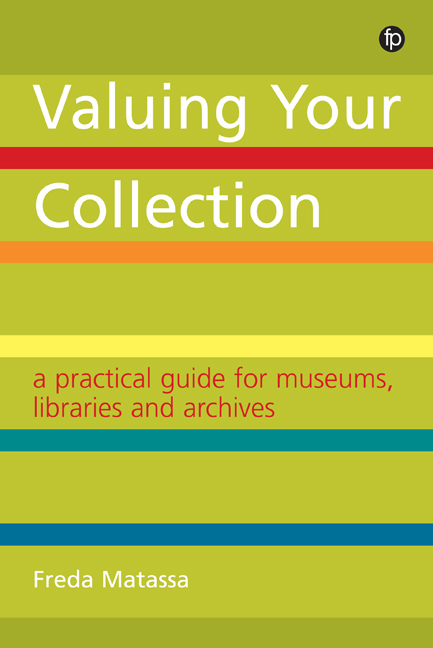Book contents
- Frontmatter
- Dedication
- Contents
- List of figures and tables
- Preface
- Acknowledgements
- 1 Introduction
- 2 The difficulty of valuation
- 3 Law and ethics
- 4 Insurance
- 5 Alternatives to insurance
- 6 Valuing your collection
- 7 Valuing an entire collection
- 8 Assigning a value
- Case studies: valuing different types of objects
- Templates
- Appendix 1 UK Government valuation of cultural items
- Appendix 2 European Report, Valuation of Works of Art for Lending and Borrowing Purposes
- Appendix 3 Glossary
- Bibliography
- Index
2 - The difficulty of valuation
Published online by Cambridge University Press: 08 June 2018
- Frontmatter
- Dedication
- Contents
- List of figures and tables
- Preface
- Acknowledgements
- 1 Introduction
- 2 The difficulty of valuation
- 3 Law and ethics
- 4 Insurance
- 5 Alternatives to insurance
- 6 Valuing your collection
- 7 Valuing an entire collection
- 8 Assigning a value
- Case studies: valuing different types of objects
- Templates
- Appendix 1 UK Government valuation of cultural items
- Appendix 2 European Report, Valuation of Works of Art for Lending and Borrowing Purposes
- Appendix 3 Glossary
- Bibliography
- Index
Summary
Introduction
The word ‘value’ has many meanings: price, worth, cost, significance, desirability, importance, asset, quality or excellence. It applies equally to financial or cultural worth. Curators know their collections in terms of significance. Stakeholders, however, often think of value only in financial terms. There may be times when both meanings coincide, for example if the key item in a collection which attracts the most visitor attention is also the one that would reach the highest sum at auction.
It is relatively easy to explain the cultural significance of an important object such as a rare biological specimen that proved a link between species, or a document drawn up by a famous person from history, perhaps at a crucial time. If one is asked to provide a financial value for the same object, the case is far less clear. The object has great intrinsic value and contributes to cultural history and knowledge but its financial price-tag does not necessarily reflect this. The financial value is what the item is worth in monetary terms at the time of asking or the price that it would be likely to sell for if offered for sale. This marks one of the difficulties: most public organisations would argue that their collections are not for sale, so it is pointless to create a hypothetical price.
If a financial value is estimated, however, it has to be considered when the object might, hypothetically, be sold. The price attached today may not be the price that the item would have been offered for a year ago and may be different from the price of the item in a year's time. Another difficulty is therefore deciding when to pinpoint the estimation. As prices go up as well as down, a value assigned today for a loan that might take place in two years’ time is likely to be unrealistic. Given the fast-moving pace of some elements of the market, a year might be too long for a price to be static. It has been known for the value of a work of art to increase overnight due to publicity, fashion, or association with a famous person. Even museum loans can double or triple in value during the run of an exhibition because of increased exposure.
- Type
- Chapter
- Information
- Valuing Your CollectionA practical guide for museums, libraries and archives, pp. 17 - 38Publisher: FacetPrint publication year: 2017



